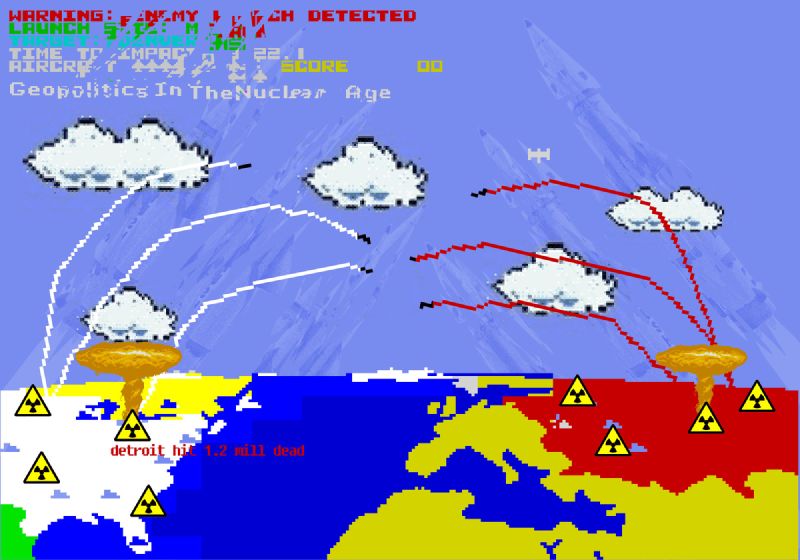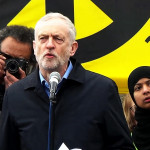What’s the point of Trident? The Prime Minister hasn’t made up her mind

Discussions about Trident always seem to take place in a hypothetical world where the only countries involved in a nuclear war are the UK and some other country who happens to be attacking us. Tonight’s Question Time made me think that was dangerous in a way I hadn’t really considered before.
Background: The UK couldn’t actually defend itself if a foreign army rocked up on our shores and started shooting everyone. But that’s okay, because we’re part of a collective defence agreement that means loads of other countries are obligated to come and shoot that army on our behalf, on the condition that we’d also do the same for them. People ask why we need nukes when Portugal or Germany don’t, and you can sort of kind of argue this is why— that the fact we have them effectively means they do too, because we’re supposed to use them in those countries’ defence should we ever need to for some mad reason. But then America is also part of this agreement, and it has loads of nuclear bombs. Is there a reason we need them as well?
My understanding is that the answer to this is the obvious one: the government that committed to a UK nuclear deterrent did so because they didn’t think collective defence was real. It’s pretty easy to see why; it’s one thing for the USA to say it would treat an attack on Birmingham the same way it would on New York, but quite another for it to actually follow through. The government that committed to the UK’s nukes did so because they believed – when push came to shove – that the U.S. would not risk its own destruction to save ourselves.
This, though, means that our defensive position is incoherent in a pretty fundamental way. The reason we don’t spend vastly more on the military than we do is because we believe collective defence works, but the reason so much of what we spend goes on nuclear bombs is because we really believe it doesn’t. I guess one of the reasons discussions around Trident fudge this is because politicians are reluctant to spell out that we could launch nukes because of a threat to a country most of us couldn’t locate on a map, but I realised tonight that it’s also fudged because it’s an argument in favour of nuclear proliferation.
It’s fairly straightforward, I think. Our argument is that having the hydrogen bomb effectively gives us greater sovereignty; the PM can make a decision to massively retaliate against a country in a way the President of Spain cannot. But if we accept that the PM should have that power – even though there are lots of perfectly good American bombs ready to be fired on his or her behalf – then it’s hard to see why the President of Spain shouldn’t have it, too. It begins to become hard to see why every country in a collective defence agreement shouldn’t have atomic bombs— but then one of the reasons such agreements were set up in the first place was to stop such a situation from happening. A large number of countries with pooled nuclear weapons makes it easy to understand what happens if you invade any of them, but if some of the countries develop their own weapons and some don’t the situation gets more ambiguous. And the more countries that have nuclear weapons, the more complex it becomes to prevent a situation where any of them are used: the number of moving parts increases, the number of potential accidents grows. The step the UK took with Trident is one the other countries of Europe cannot repeat, but when we argue our deterrent is needed for our own defence there’s a sense in which we’re encouraging exactly that.
I worry about nuclear weapons because I can see collective defence collapsing, and collapsing suddenly. I think there may come a point where a great number of people in the U.S. and UK realise they may be asked to die to defend a small country somewhere, and if that does happen I think the response of the public will be politically devastating. If this does happen then we need to argue that other countries shouldn’t make the decisions around nuclear weapons we did, and that the example we set around them wasn’t noble or sensible or the grown-up thing to do, but an incredible act of irresponsibility in terms of the precedent it sets. I think that becomes less likely the more we talk about our deterrent standing alone, our PM pushing the button, our military independence prioritised. And I think that makes our position a threat; very possibly a global one. It is not Jeremy Corbyn who is promoting these narratives. He is not the one who is making us more unsafe.


I am personally totally against Trident which I think is just pointless for the UK to supposedly have,it puts us at much greater risk also it is extremely expensive & we can not spend so much oon this while not supporting the NHS & Social care amongst others which we should support while also the pot holes in the roads are14 years behind in their repairs.
People who vote for NUclear weapons may be suicidally MAD but do not know it
You imbecile, voting to NOT have Nuclear weapons is suicidally mad. A country having nuclear weapons is the ONLY thing stopping other people from using the same weapons on it. Without nuclear weapons, we are seen as an easy, weak target, and they have no reason not to push the button and wipe us out. If we have the same weapons they do, they know that by pushing that button they are killing themselves and all of their own civillians, therefore nuclear weapons are absolutely necessary for our safety and growth.